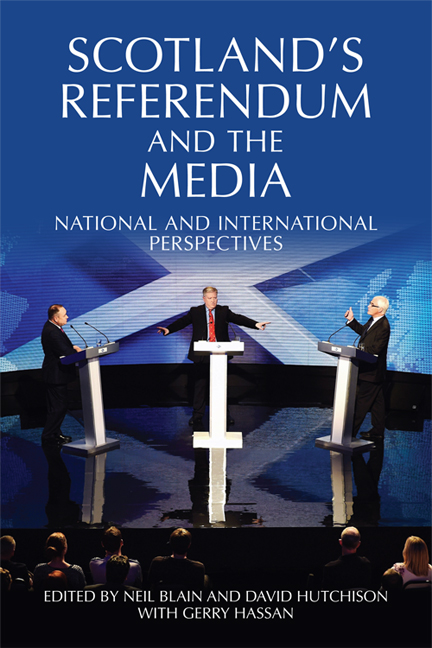Book contents
- Frontmatter
- Contents
- Preface
- Part One The Referendum in Scotland
- Part Two Views from the UK
- 9 English Television News Coverage of the Scottish Referendum
- 10 The English Press and the Referendum
- 11 Wales, Devolution and the Scottish Independence Debate
- 12 Our Friends Across the Water: Northern Ireland Media Coverage of the Scottish Independence Referendum
- Part Three International Perspectives
- Notes on the Contributors
- Index
12 - Our Friends Across the Water: Northern Ireland Media Coverage of the Scottish Independence Referendum
from Part Two - Views from the UK
Published online by Cambridge University Press: 05 August 2016
- Frontmatter
- Contents
- Preface
- Part One The Referendum in Scotland
- Part Two Views from the UK
- 9 English Television News Coverage of the Scottish Referendum
- 10 The English Press and the Referendum
- 11 Wales, Devolution and the Scottish Independence Debate
- 12 Our Friends Across the Water: Northern Ireland Media Coverage of the Scottish Independence Referendum
- Part Three International Perspectives
- Notes on the Contributors
- Index
Summary
Background
The resonance of the referendum for the people of Northern Ireland
Galtung and Ruge talk of news values that tend to construct the news, and one of these is ‘proximity’. Events tend to be more likely to make the news if they are geographically close, so it is no surprise that we saw significant coverage of the Scottish independence referendum in Northern Ireland. Perhaps more importantly, however, ‘proximity’ refers also to political closeness, and there is no doubt that this aspect made the referendum all the more newsworthy for the Northern Irish media, to differing extents for different media providers.
Independence, nationhood, self-determination and identity are highly resonant and contested concepts for the people of Northern Ireland. There are few incidences these days of these issues being contested by violent means, which was the lens through which the world's media largely knew and understood us in the past. The issues might be more symbolic now, but they are based on very real shifts in power over the years. The potential for another shift in power, albeit one that would affect us indirectly rather than directly, took these issues beyond the symbolic realm for a time, and legitimised explicit discussion of potential changes in our own situation, which unsurprisingly were welcomed and scorned, depending on who you were speaking to, or what you were reading or watching.
Given the extent of the coverage, choices of focus have been necessary. This chapter will discuss in detail the press coverage of the referendum, and provide a broad outline of the tone of broadcast coverage, along with responses to the result from key Northern Ireland politicians.
Some historical and political context
The Irish Republic secured its independence from Britain in 1921 after a bloody conflict. The six counties in the north remained part of the UK, but opinion was divided on whether this was an acceptable settlement, and some continued the struggle for the ‘six counties’ to reunite with the Irish Republic. It is widely accepted that Catholics were discriminated against under the devolved Parliament of Northern Ireland in terms of both representation and parliamentary practices.
- Type
- Chapter
- Information
- Scotland's Referendum and the MediaNational and International Perspectives, pp. 132 - 144Publisher: Edinburgh University PressPrint publication year: 2016



